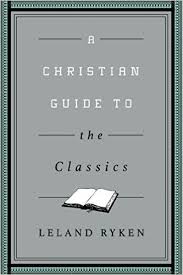 Leland Ryken, A Christian Guide to the Classics (Wheaton, IL: Crossway, 2015). Paperback | Kindle
Leland Ryken, A Christian Guide to the Classics (Wheaton, IL: Crossway, 2015). Paperback | Kindle
The more I watch television, the more I like books. The reason is not that there are few good television shows these days. On the contrary, television is experiencing something of a Golden Age, especially if you have cable or a streaming service.
The reason I like books more is because they have depth and require imagination. An actor must communicate in one take what an author can communicate over several pages. And the visual media makes decisions for you. Read Pride and Prejudice, and you can imagine Mr. Darby looking a number of different ways. Watch Pride and Prejudice (the PBS version preferably), and Mr. Darby will always look like Colin Firth.
So, books. But which books? Every reader has a preference, and mine tend to run toward mysteries and thrillers when it comes to pleasure reading. As a religion journalist, my professional reading—which I also enjoy—runs toward theology and ministry.
In A Christian Guide to the Classics, Leland Ryken makes a case for what used to be called “the Western canon.” These are the books, essays, stories, and poems that have endured and been considered influential through the ages because of their literary excellence and ability to inspire. They evince different worldviews (pagan, Jewish, Christian, secular) and encompass many genres (history, novels, poems), but they bring people together into a grand, ongoing conversation about life in its manifold variety.
The Classics are, by nature, elitist, but they have a capacious elitism, one that can be entered into by any who take them up and read. Ryken doesn’t quote her, but Maya Angelou’s comment that “Shakespeare must be a black girl” is apropos. If a dead white man can express universal human longings that a poor black girl can embrace, then he has written a classic.
For Christians, of course, the Bible is the classic to read. As Ryken argues, however, reading the Bible is not an alternative to reading other classics. Rather, it can be read alongside those classics, with the proviso that as Christians, we read the Bible humbly because of its authority over us, whereas we read other classics critically, knowing that they can err and mislead. God’s common grace is such that even in pagan texts that err, aspects of our common humanity come to light and find expression.
Ryken’s introduction addresses three questions: the nature of the classics, their value, and how to read them. His answers are workmanlike and analytical. His prose is clear and precise, though not necessarily memorable. The book’s back page contains a list of “Christian Guides to the Classics” that Ryken has penned on The Odyssey, Paradise Lost, Hamlet, The Scarlet Letter and other works. I have not read them, though I’m sure that they would make for helpful companions as you read those books.
I have this confidence because I took classes from Prof. Ryken when I matriculated at Wheaton College in the late 1980s. His workmanlike, analytical lectures helped me read literature in a different, better, more Christian way. Reading A Christian Guide was like a welcome return to his classroom, one that has encouraged me to get out my mystery/thriller rut and read the classics.
—–
P.S. If you found my review helpful, please vote “Yes” on my Amazon.com review page.


One thought on “Review of ‘A Christian Guide to the Classics’ by Leland Ryken”